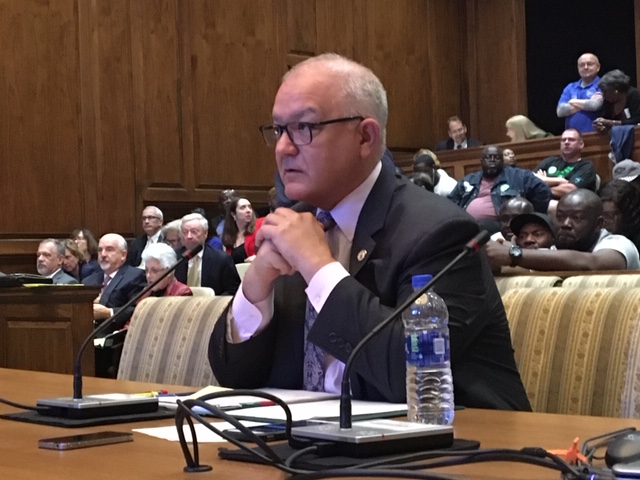As BPW Prepares for Budget Cuts, Liberal Groups Argue They’ll Hurt Md.’s Neediest

The Board of Public Works, which has sole domain over the state budget when the General Assembly isn’t in session, is expected to vote on a round of spending cuts at its next meeting Wednesday — the first day of the 2021 fiscal year.
With state revenues cratering due to the economic impact of the COVID-19 pandemic, state Budget and Management Secretary David R. Brinkley is preparing recommendations for proposed cuts for the BPW — the governor, the comptroller and the treasurer — to consider. It is not clear yet how big the cuts will be or which state agencies and programs will be targeted.
But in advance of the meeting, a coalition of 27 progressive groups wrote this week to Gov. Lawrence J. Hogan Jr. (R), Comptroller Peter V.R. Franchot (D) and Treasurer Nancy K. Kopp (D), urging them to act judiciously and protect Maryland’s most vulnerable residents as they decide what cutbacks to make.
The letter is accompanied by a new report from the liberal Maryland Center for Economic Policy examining the dramatic budget cuts the Board of Public Works made during the Great Recession of 2008 and 2009, suggesting that many of the reductions were ill-advised and had a long-term adverse impact on Maryland’s economy and residents.
The letter to the BPW — which was signed by civil rights organizations, labor unions, nonprofit groups, faith organizations and anti-poverty advocates — urges the officials to refrain from making budget cuts until the next round of federal aid to the states is determined by Congress and the Trump administration. If budget cuts become necessary, the groups write, state leaders should adhere to the following “principles”:
• Protecting the most vulnerable Marylanders. “It is vital that the state maintains full funding for our safety net programs and ensure that the state agencies and nonprofits that administer them are able to retain sufficient staff to respond to the increased need for assistance,” the groups write. They want the state to maintain budgeted Medicaid provider rate increases and they want officials to maintain or expand eligibility for federal family income support programs, like food stamps, cash assistance and Medicaid.
• Continuing investments “in Maryland’s future,” including “longer-term investments to improve our education system.”
• Preserving the state’s workforce, which, the groups argue, “is vital both to maintaining the services Marylanders rely on and to support a robust economic recovery.”
The groups are using the report from the Maryland Center for Economic Policy on the Great Recession budget cuts to buttress their arguments.
The report concluded:
• The state’s cuts to local health departments during the
Great Recession, which already were receiving inadequate state support, prompted all 24 local agencies to lay off staff and curtail or eliminate services. Maryland did not adequately restore the funding in subsequent years, the center suggested — which likely made communities more vulnerable and unable to respond effectively to COVID-19.
• Maryland public schools lost 1,600 teachers from 2008 to 2013, the report says, even as enrollment grew by nearly 14,000 students. These staff reductions hit especially hard in schools serving large numbers of students of color or students in low-income families.
• Deep budget cuts led to fewer investments in affordable housing and community revitalization programs, which exacerbated problems that precipitated the Great Recession and then made matters worse.
• Job losses for state and local government workers had a ripple effect on Maryland’s economy, causing a deeper downturn and a weaker recovery.
“We have the chance to learn from the mistakes we made responding to the last major economic crisis,” said Benjamin Orr, executive director of the Maryland Center for Economic Policy. “We need our elected officials at all levels of government to commit to protecting the foundations of our economy and ensuring families can meet their basic needs. A response that focuses only on cuts could eliminate thousands of jobs and would impose needless suffering on residents of every part of Maryland.”
Despite the progressive groups’ lobbying campaign geared toward the three principals on the Board of Public Works, it isn’t clear whether Hogan will be at the session next Wednesday. Since the coronavirus hit Maryland in March, Hogan has focused exclusively on the state response to the public health and economic crises and turned day-to-day operations of state government over to Lt. Gov. Boyd K. Rutherford (R), who has presided over every BPW meeting since then.
Franchot and Kopp were already serving the last time the BPW was called upon to make major budget cuts, along with then-Gov. Martin J. O’Malley (D).
In a related development, the coalition of progressive groups that fought to bring a $15-an-hour minimum wage to Maryland held a virtual rally on Tuesday night, urging the BPW not to pause the gradual annual increases that will get the state to the $15 rate in 2026.
The minimum wage law allows officials to put off the step increases for one year if the state economy falters — and business groups have been urging the BPW to hit pause so small businesses that have been suffering during the pandemic can stabilize. But at the rally Tuesday night, activists said a delay would hurt Marylanders who need the most financial help during the economic crisis.
“Structural inequity is at the heart of all the problems that we face,” said the Rev. Kobi Little, president of the Baltimore City chapter of the NAACP.
The current $11-an-hour minimum wage is scheduled to go up to $11.75 on Jan. 1 — $11.60 at smaller companies.
“Leave it in place — because there can be no recovery without equity,” Little said.
The Baltimore Sun reported Wednesday that the BPW is likely to keep the minimum wage hike intact: Both Kopp and Franchot said they were not in favor of delaying it.




 Creative Commons Attribution
Creative Commons Attribution